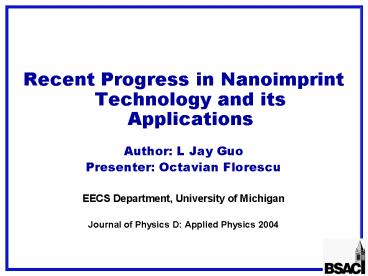Recent Progress in Nanoimprint Technology and its Applications - PowerPoint PPT Presentation
1 / 11
Title:
Recent Progress in Nanoimprint Technology and its Applications
Description:
Recent Progress in Nanoimprint Technology and its Applications Author: L Jay Guo Presenter: Octavian Florescu EECS Department, University of Michigan – PowerPoint PPT presentation
Number of Views:127
Avg rating:3.0/5.0
Title: Recent Progress in Nanoimprint Technology and its Applications
1
- Recent Progress in Nanoimprint Technology and its
Applications - Author L Jay Guo
- Presenter Octavian Florescu
- EECS Department, University of Michigan
- Journal of Physics D Applied Physics 2004
2
Outline
- Motivation for NanoImprint Lithography (NIL) in
biological applications - NIL used in various blocks intended for
bio-applications - Analyte Manipulation
- Analyte Separation
- Analyte Detection
- Conclusions
3
Motivation What is appealing about NIL for bio
applications?
- Cost
- Biosensors are often disposable
- Resolution
- In some cases the biosensor sensitivity depends
on minimum feature size - Novel structures
- Enables more/different applications than
traditional photolithography
4
Analyte Manipulation Microfluidics
- NIL enables sealed channels with predictable
dimensions - Cost effective
Guo L J, Cheng X and Chou C F 2004 Nano Lett. 4 69
5
Analyte Separation
- Electrophoresis
- Capillary effect due to the nano pillars emulates
a high viscosity gel
Pepin et al., Microelectronic Engineering 6162
(2002)
6
Analyte Separation
- Filters
- Generated by multi-level reverse nanoimprinting
Bao L R et al., 2002 J. Vac. Sci. Technol. B 20
2881
7
Analyte Separation
- Protein patterning
- NIL in conjunction with lift-off to define areas
coated with functional protein
Falconnet et al., Nano Letters 2004
8
Analyte Detection
- Electrochemical transducers
- Nano particles/ molecules between electrodes
change conductance (i.e. redox cycling) - Smaller inter-electrode distance can improve
sensitivity
Vieu et al., LITHO2004, June 2004, Beck et al.,
Microelectronic Engineering 7374 (2004)
9
Analyte Detection
- Cantilever
- Nanoparticles/molecules can change cantilever
properties - Smaller cantilevers can detect single binding
events
Luo et al., Nanotechnology 17 (2006) 19061910
10
Conclusions
- NIL is remarkably well suited for bio
applications - Low cost
- Versatile
- One of the main stumbling blocks for bio
applications is separation of analytes - NIL is a potential cost effective solution
11
Thank you!































